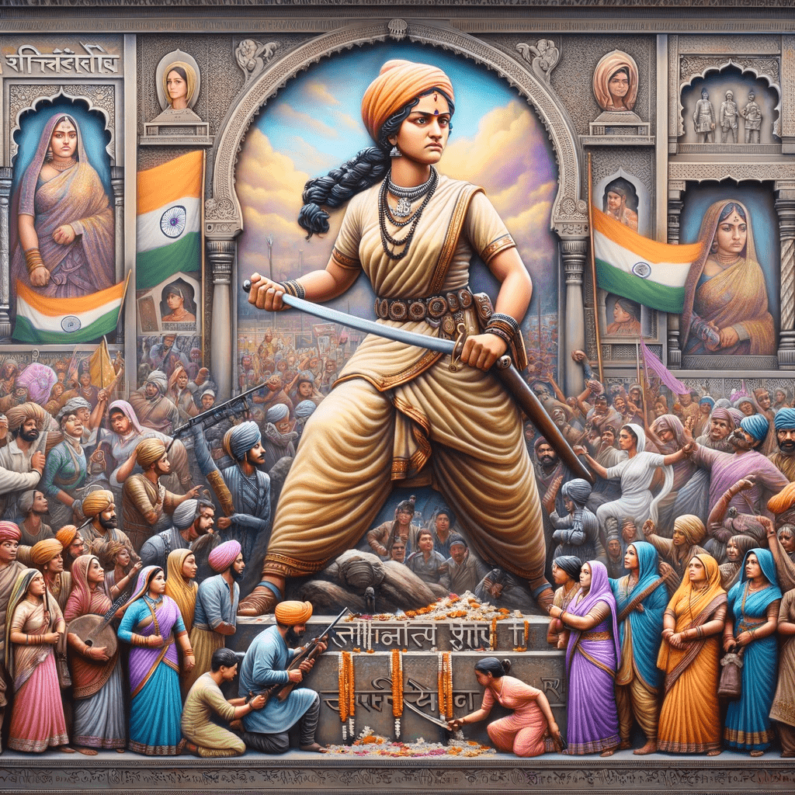Jhalkari Bai, an extraordinary figure often overlooked in the annals of Indian history, deserves recognition for her invaluable contributions to the country’s freedom struggle. Despite being relatively unknown to many, her story is one of unwavering courage, selflessness, and determination. This article aims to shed light on the remarkable life and legacy of Jhalkari Bai, highlighting her pivotal role in the fight against colonial oppression. From her early years to her pivotal role in the Indian Rebellion of 1857, readers will gain a profound understanding of this remarkable historical figure and her enduring impact on India’s journey to independence. Join us as we delve into the remarkable and inspiring story of Jhalkari Bai, a true hero of India’s history.
Introduction to Jhalkari Bai
Jhalkari Bai, a prominent figure in the history of Indian independence, was a brave warrior from the Koli community, hailing from the region of Bundelkhand in Jhansi.
Known for her fearlessness and unwavering dedication to the cause of freedom, Jhalkari Bai played a vital role in the Indian Rebellion of 1857. She fearlessly adopted the identity of Rani Laxmi Bai, the queen of Jhansi, and led an all-female army, displaying exceptional courage and strategic acumen. Her legacy remains a source of inspiration, particularly for the Dalit communities, as she defied societal norms and rose to prominence through her sheer determination and exceptional military prowess.
Early Life and Sociopolitical Environment
Jhalkari Bai’s early life was intertwined with the sociopolitical landscape of Bundelkhand, where the influence of folklore and the resilience of the Koli community shaped her formative years amidst the burgeoning rebellion against oppressive forces.
Role in the Rebellion of 1857
Jhalkari Bai played a pivotal role in the Rebellion of 1857, standing as a courageous warrior and soldier alongside the iconic Queen Laxmi Bai, confronting the British forces led by Hugh Rose.
Her involvement went beyond mere combat; she also worked closely with Queen Laxmi Bai, managing crucial strategies and aiding in troop organization. Jhalkari Bai’s remarkable bravery and quick thinking enabled her to lead the warrior women in various skirmishes against the British, showcasing exceptional military prowess.
One of her notable actions involved disguising herself as the Queen during an attack, diverting the attention of the British forces and allowing the real Queen Laxmi Bai to escape unharmed, solidifying her reputation as an exceptional tactician. This act of valor earned her the respect and admiration of her fellow fighters and the Queen herself, solidifying her place in history.
Bravery and Martyrdom

Jhalkari Bai’s bravery and martyrdom in the face of adversity have immortalized her as a hero, known for her heroic deeds and unwavering spirit in the resistance against the British Army.
As a woman born into a humble family in the region of Bhojla in the early 19th century, Jhalkari faced numerous challenges from a young age. Her courage was evident in her decision to disguise herself as the legendary queen, Rani Laxmi Bai, thus managing to protect her from the advancing British forces. She fought valiantly, leading a group of women warriors, and her strategic prowess on the battlefield has been the subject of many tales and legends.
Commemoration and Cultural Legacy
The commemorations and cultural legacy of Jhalkari Bai are woven into the fabric of oral narratives, folklore, and heritage, ensuring the preservation of her unsung legend and the recognition of her monumental contributions.
She has been immortalized through stories passed down through generations, where her bravery, loyalty, and dedication stand as a testament to her enduring cultural significance. Jhalkari Bai holds a revered place in the hearts of many, inspiring countless individuals with her unwavering courage and resilience.
Her portrayal in folk songs and local performances further cements her status as a revered figure, solidifying her legacy.
Impact on Dalit History and Societal Importance

As a dedicated writer and martial art enthusiast, I have carved a unique niche where the pen and the sword truly coexist. With over a decade of experience, my journey has been one of constant evolution, blending the discipline and focus of martial arts with the creativity and depth of writing. My work spans various genres, including fiction, self-help, and martial arts instruction, offering readers insights not just into the arts themselves, but into the life lessons they embody.

